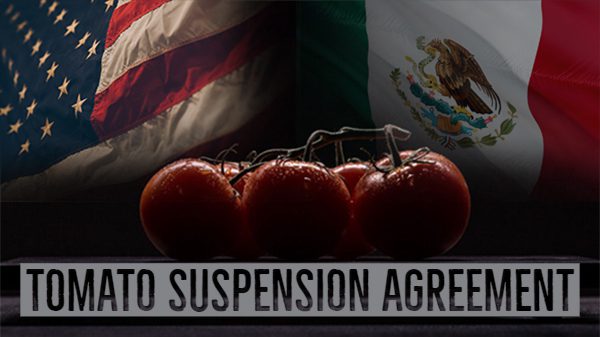Inspections on Mexican tomatoes crossing the United States border are scheduled to start in less than two weeks.
That’s a good thing, said Dante Galeazzi, CEO/President of the Texas International Produce Association BB #:162361.
On March 18, The U.S. Department of Agriculture issued a reminder that the USDA Agricultural Marketing Service will begin inspections of tomatoes coming into the United States from Mexico at border locations on April 4.
“I checked with the officials that will do the tomato inspections earlier this week,” he said March 20. “They said, ‘Yes it will go forward,’ the same as the rest of government inspections.”
AMS will inspect all Mexican grape tomatoes in bulk and all Mexican round and Roma tomatoes, including stem-on, for quality and condition upon their entry into the United States from Mexico.
Importers must request an AMS inspection when the load is available for inspection and pay the associated fees.
Galeazzi said the inspections will take place at importers’ facilities, and the larger importers will have their own inspectors, just as the larger importers of onions or avocados.
At the time the U.S. and Mexican growers agreed to these inspections as part of the tomato suspension agreement, Mexican tomato importers were concerned USDA would provide enough inspectors.
Galeazzi said he’s been told there will be 20-30 inspectors in South Texas with more in reserve.
“I think they have enough,” he said. “We want no interruption to the produce business. The more resources they have the better.”
One concern is that the COVID-19 virus or government actions could delay the inspection process, but Christopher Krebs, director of the Cybersecurity and Infrastructure Security Agency said the produce industry and inspections are among the critical infrastructure jobs that are to maintain normal work schedule during any government virus directive.
Galeazzi said another concern is that importers may not know what to do to get inspections, but most importers should be familiar with the process.
“This is an added cost,” he said, “so it’s a barrier, but it’s not enough to interrupt the flow of fresh tomatoes to the U.S.”
He said as of March 20, he has not heard of any significant change in demand as a result of business shut-downs because of COVID-19. While foodservice business is off, retail seems to have picked up, he said.



